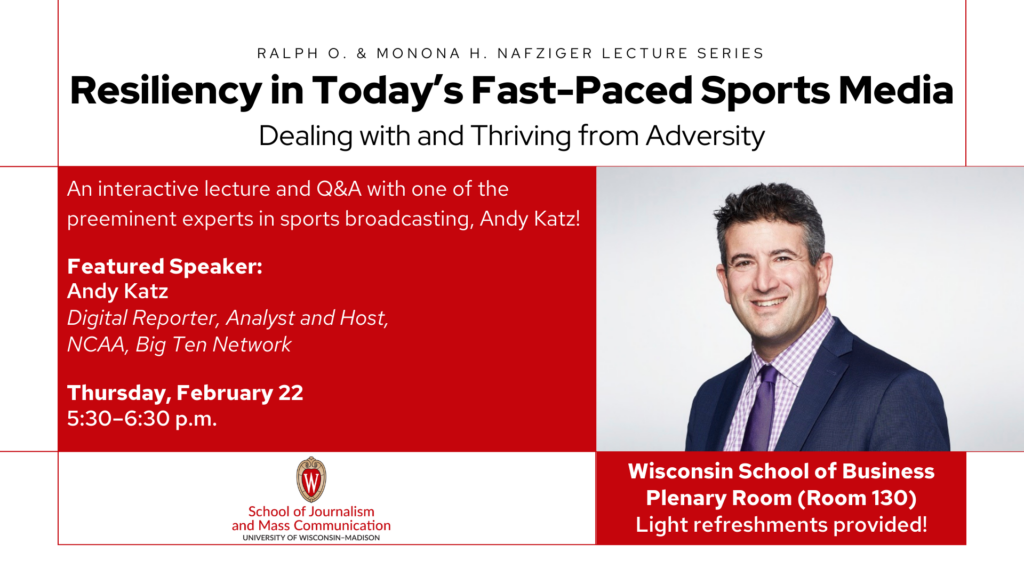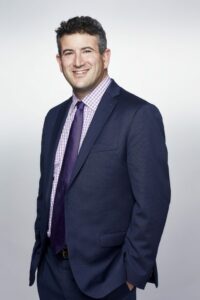
Join Andy Katz, a seasoned sports reporter renowned for his contributions to ESPN, Big Ten Network, NCAA and Turner Sports on February 22nd for an interactive talk and Q&A. With a wealth of experience navigating challenging situations, Katz brings a unique perspective to the table, making his upcoming presentation a must-attend event.
 In his talk, “Resiliency in Today’s Fast-Paced Sports Media – Dealing with & Thriving from Adversity,” the UW alum will share insights gained from navigating the dynamic world of sports journalism. Discover insights about his experience, from working with the Daily Cardinal during his undergraduate years to becoming a big player in sports media.
In his talk, “Resiliency in Today’s Fast-Paced Sports Media – Dealing with & Thriving from Adversity,” the UW alum will share insights gained from navigating the dynamic world of sports journalism. Discover insights about his experience, from working with the Daily Cardinal during his undergraduate years to becoming a big player in sports media.
Prior to the event, we sat down with Katz to talk about his career and advice to students who want to pursue sports media.
Can you share a memorable moment from your career?
The highlight was the eight years doing the March Madness bracket with [former president Barack] Obama. This was a great example of seizing an opportunity.
I was working on a story for “Outside the Lines” about the Obamas and basketball. Then-senator Obama was our last interview in October of 2008. In the morning, two weeks before the presidential election, Colin Powell, a Republican, endorsed him over [Senator John] McCain. Obama was about to give a speech at Fort Bragg, so now he had to change his speech. His advisors came into the room and they said ‘we have to change his speech, hold tight.’ We’d already done the interview. So we had about a half hour of just sitting there with him, me, the cameraman, the producer, and Secret Service agents and I just had this epiphany. We were doing the interview, and I said, ‘Senator, I have a great idea. If you win the presidential election, I want to come to the White House in March and do the NCAA basketball bracket with you for March Madness.’ And he says, ‘Let’s do it.’ When he won, I followed it up, they remembered, and we did it for eight straight years.
It was all because of that moment, me asking. He could have said no obviously, but if you don’t ask, you don’t know what’s going to happen.
How do you see the future of sports journalism evolving?
Well, it’s interesting. At the end of the day, the athletes and coaches, they don’t want to do the reporting work. They’re athletes and coaches. So the stories still need to be told. I’m a believer that athletes and coaches, administrators, and more want their stories told, and maybe they’re not the best storytellers. So there’s still value in that role. And then also, they love gossip. They love knowing what’s going on with this school with that team with this player. In my 30 years of experience, I cannot tell you how often I’ve been asked by a coach ‘what’d you hear?’ It’s not coming from a fellow journalist. It’s another coach. It’s another player. They want to know what’s going on. Information and content are king and queen and I think it always will be.
Were there any specific experiences at UW that sparked your passion for sports reporting?
We did a story at the Daily Cardinal on the disparity of black athletes and black students versus white athletes and white students on Madison. At the time, the majority of black students were athletes on campus. I remember sitting in the athletic director’s office and he was yelling at us. He was mad that we had done this story and portrayed the athletic department in this light and basically threw us out.
That was an eye-opening experience to me. We did a story that we thought was the important truth to show what campus is like and it upset someone. But you know what? That’s ok. Sometimes people don’t like to see what the truth is. Looking back, we stood our ground, we knew we were in the right. Sometimes you have to do things that are going to upset people. You just have to report the facts and the truth.
What advice do you have for students who hope to pursue a career in sports media?
I always say you have to be aggressive, not annoying. You want to be in a position to be authoritative, but not condescending in your coverage. You have to prepare. But don’t be a know-it-all. And more than anything, two very basic things, but people don’t do it all the time. You have to literally ask a question. A lot of people just make statements or ask closed questions, not open questions. And you have to listen. Because so often someone will say something that will open a window for you that you didn’t know existed.
What do you hope students take away from your upcoming presentation?
They have to realize the resiliency that you have to deal with. There are many times life does not go as scripted, so how do you handle it? I want to use anecdotes in my career about how I was able to navigate that to get to where I’m standing now.
Mark your calendar for February 22nd at 5:30 p.m. for an inspiring talk and interactive Q&A by one of UW’s best!